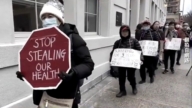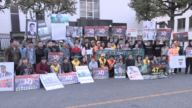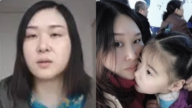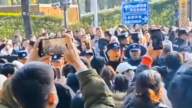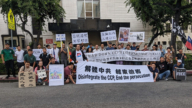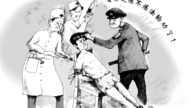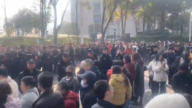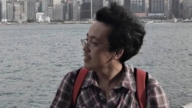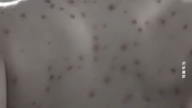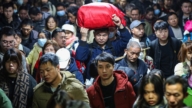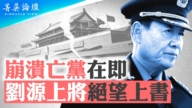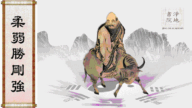【新唐人2013年12月21日讯】连日来,大陆各地区的检察院和法院加快步伐,准备在未来几周内,对多名异议人士进行起诉或者审判。据了解,在中国,每年的圣诞节和新年期间,火速审讯异议人士,已成为惯例。这其中,中共到底包藏了什么心机?一起来听听外界的看法。
《美联社》12月18号的报导指出,多名大陆维权律师证实,中国各地区的检察院和法院,最近加快了处理案件的速度,准备在未来几周内,起诉或者审判多名异议人士。
报导说,有些案子已经等了几个月,却在过去几天忽然加快程序,移交到法庭。一些维权律师表示,有关当局可能是希望趁节假日,在西方外交官、人权组织工作人员、和外国驻华记者休假期间,加快对异议人士的审讯。
今年7月被捕的中国法律学者许志永一案,就是其中之一。
作为民间组织“公盟”的创始人之一,许志永是中国“新公民运动”的标志性人物。12月上旬,美国国务卿克里曾对许志永一案表示关注。而中共当局在12月13号正式起诉许志永,罪名是所谓的“扰乱公共秩序”。这项罪名也被认为是当局针对维权人士,所提出的最常见的罪名。
另外,安徽异议人士张林,于今年(2013年)8月被当局以“涉嫌聚众扰乱公共场所秩序罪”逮捕。12月18号,张林一案开庭。代理律师刘晓原在宾馆受到骚扰,一些前去声援张林的网友也受到警方阻挠。
大陆维权律师江天勇:“中国那些司法部门,它没有把心思放在如何去根据法律来审查,来看是否有利做出法律的判断。而是把更多心思放在挑选一个什么日子,如何降低这个案件在公众以及在外国的影响,尤其是降低媒体的影响。”
目前被软禁在北京寓所的维权人士胡佳,18号晚间对《自由亚洲电台》表示,在中国,每年的圣诞节、或新年期间,火速审讯异议人士已经是惯例。比如维权律师高智晟一案,在2006年12月22号开庭;而他自己,则在2007年12月27号被捕。都在圣诞节和新年附近。
胡佳感慨,这只能说明中共外交和政法维稳机关的龌龊,和他们刻意回避西方社会压力的一种诡诈。而大陆维权律师 江天勇则表示,对于那些异议人士,中共恰恰是想选择能让他们的家人、朋友感到痛苦的日期,来审判他们。
江天勇:“ 我觉得这种选择开庭和宣判日期,不仅反映当局没有从法律上考虑,而且它这种选择和基本人性、人道是背道而驰的。 因为无论是在中国还是西方,这些节日都是家人团聚的日期。”
今年8月初就被关押的广州举牌运动先驱、异议人士郭飞雄,被控涉嫌“聚众扰乱公共场所秩序”一案,日前在没有通知律师的情况下,已被秘密移送检察院审查起诉。
陕西异议人士赵常青,也在这个月被移送审查起诉。
此外,12月16号,广州异议人士刘远东收到了法院的正式起诉书,他是在今年2月被当局抓捕。起诉书在原有罪名上又增加了“聚众扰乱公共场所秩序罪”。
胡佳说,街头运动在广州颇有影响,有关当局忽然增加刘远东的罪名,很可能是想试图借此整治各地的街头运动。
中国东南大学法学院教授张赞宁:“对异议人士进行审判,说明在中国大陆还是很害怕不同的声音,还是在压制民主,还是在实行党禁、报禁,凡是有不同的声音它都认为是‘颠覆罪’,和‘打算颠覆罪’,所以这个政府是个很虚弱的政府,是个不愿意接受群众批评监督的政府,就是一个独裁政府。”
在今年7月许志永被拘捕后,9月13号,另一位“新公民运动”的发起人之一王功权、也被警方逮捕。
采访/陈汉 编辑/王子琦 后制/李勇
CCP authorities secretly speed up prosecution of activists
Local procuratorates and courts in Mainland China
are speeding up the cases or trials of several activists
within the following weeks.
Accelerating the trials of activists is said to have become
a routine practice in Mainland China during
the period of Christmas and New Year holidays.
But what exactly is the secret the Chinese regime is hiding?
An Associated Press report on Dec. 18 said several mainland
Chinese human rights lawyers confirmed that local
procuratorates and courts are speeding up the case processing,
and preparing to prosecute or sentence some activists
within a couple of weeks.
According to the report, some cases which had been halted
for several months are suddenly being quickly processed,
and then transferred to the courts.
Some human rights lawyers say local authorities hope to
expedite sentences on activists while western diplomats,
staff of human rights organizations and foreign media reporters
in China are all on their holidays.
Chinese law scholar Xu Zhiyong’s case is
one of these expedited cases.
Xu was arrested in July of this year.
As one a co-founder of the NGO Open Constitution Initiative,
Xu Zhiyong is an iconic figure of
China’s New Citizens Movement.
In early December, the American Secretary of State
John Kerry expressed his concerns over Xu’s case.
On Dec. 13, Xu was officially charged with
the crime of so called “disrupting public order".
This crime is regarded as the most common one
designed for activists.
Anhui activist Zhang Lin was arrested
by the local authorities in August.
He was then charged with the crime of being a
“suspect in gathering a crowd to disrupt public order".
When Zhang’s court case opened session on Dec.18,
his lawyer Liu Xiaoyuan was harassed in the hotel he stayed
at and some visiting netizens who support Zhang
were also blocked by the police.
Jiang Tianyong, China-based human rights lawyer:
“Chinese judicial departments are not interested in
processing cases by law and looking into
whether the judgment is in favor of law.
On the contrary, they are more interested in deliberately
selecting particular dates to minimize the influence
of the case on the public, foreign countries,
and especially the media."
Human rights activist Hu Jia is now
under house arrest in Beijing.
He told Radio Free Asia on Dec.18th that it’s become the routine
every year in China to have activists quickly sentenced
during Christmas and the New Year.
For example, human rights lawyer Gao Zhisheng’s case
was opened with court sessions on Dec. 22, 2006.
Hu Jia himself was arrested on Dec. 27, 2007.
Both of these two cases took place in the time
around Christmas and the New Year.
Hu Jia says this only shows the filthiness of the CCP’s
diplomacy and it’s political stability maintenance laws,
and the craftiness of the CCP intentionally
evading western society’s attention.
China-based lawyer Jiang Tianyong says the CCP precisely
wants to sentence those activists on the particular chosen date
which can make their family members and friends suffer most.
Jiang Tiangyong:"I think selecting dates like this to open court
on and sentence activists shows that local authorities not only
have no consideration for these cases from the angle of law,
but they also violate basic human nature and humanity.
Because whether it is China or western countries,
these holidays are times for family to reunite."
Activist Guo Feixiong was detained in early August of 2013
for displaying sensitive political slogans
in a public area of Guangzhou City.
He was charged with being a suspect in
“gathering a crowd to disrupt public order".
A couple of days ago he was secretly transferred to a local
procuratorate for prosecution without his lawyer’s knowledge.
Shaanxi activist Zhao Changqing was also transferred to
a local procuratorate for prosecution this month.
On Dec. 16, Guangzhou activist Liu Yuandong received
the formal statement of charges from the court.
He was arrested in February of this year.
On the statement, his additional crime is
“gathering a crowd to disrupt public order".
Hu Jia says public activities by activists in Guangzhou City
has a significant impact. The local authorities’ suddenly
adding a new allegation on Liu Yuandong might well be
an attempt to curb such public activities across the country.
Zhang Zanning, law professor at China’s Southeast University:
“Sentencing activists shows that Mainland China’s authorities
fear different voices, and they still suppress Democracy
and carry out the party-ban and publishing-ban.
The CCP authorities declare all different voices as
‘committing the crime of overthrowing the existing regime’
and ‘the crime of preparing to overthrow the existing regime’.
Therefore this government is very weak
and is unwilling to accept the criticism and monitoring
from the people, and is an autocratic government."
After Xu Zhiyong was arrested in July of this year,
another co-founder of the “New Citizenship Movement"
Wang Gongquan was also arrested by the police on Sept. 13.
Interview/ChenHan Edit/Wang Ziqi Post-Production/LiYong


